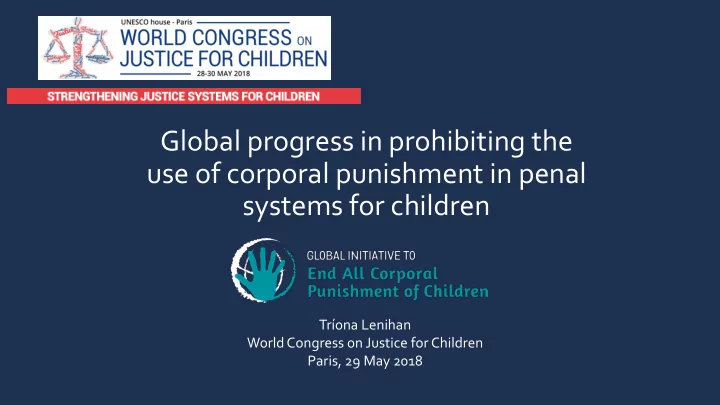

Global progress in prohibiting the use of corporal punishment in penal systems for children Tríona Lenihan World Congress on Justice for Children Paris, 29 May 2018
How we work ___________________________________ • Established 2001 • Conduct legal research, maintain detailed reports • Monitor research on corporal punishment • Brief and review the work of human rights treaty bodies and the UPR • Promote advocacy at national, regional and international level
Definition of corporal punishment ___________________________________ • “any punishment in which physical force is used and intended to cause some degree of pain or discomfort, however light” hitting with a hand or an implement, kicking, shaking, throwing, scratching, pinching, biting, pulling hair, boxing ears, forcing children to stay in uncomfortable positions, burning, scalding or forced ingestion • “non -physical forms of punishment that are also cruel and degrading” punishment which belittles, humiliates, denigrates, scapegoats, threatens, scares or ridicules the child UN Committee on the Rights of the Child, General Comment No.8, 2006
Negative effects of corporal punishment ___________________________________ • Direct and indirect physical harm • Poorer mental health, including: Increased risk of depression, anxiety, drug/alcohol abuse, etc • Poorer cognitive development and moral internalisation • Poorer educational outcomes • Increased aggression and antisocial behaviour • Increased approval and use of violence in peer relationships • Adult perpetration of violent, antisocial and criminal behaviour • Experience of intimate partner violence (as victim or perpetrator)
Obligation to prohibit corporal punishment in all settings ___________________________________ • UN Convention on the Rights of the Child (arts. 19, 28(2) and 37) • Committee on the Rights of the Child: General Comment No. 8, 2006 Concluding observations on state examinations (451 to 190 states) • Other UN and regional human rights treaties and monitoring bodies • Recommendations made under the Universal Periodic Review (UPR)
Obligation to prohibit in penal systems ___________________________________ Abolition in penal systems is required under the: • Guidelines for Action on Children in the Criminal Justice System, adopted in 1997 • Guidelines on eliminating violence against children in justice systems, adopted in 2014 Its use is condemned by the: • UN Standard Minimum Rules for the Administration of Juvenile Justice (the “Beijing Rules”) • UN Rules for the Protection of Juveniles Deprived of their Liberty • UN Guidelines for the Prevention of Juvenile Delinquency (the “Riyadh Guidelines”)
Corporal punishment lawful as a sentence for crime ___________________________________ Corporal punishment - whipping, flogging, caning - still lawful under state, traditional and/or religious law as a sentence for crimes committed by juveniles: Afghanistan, Bahamas, Bangladesh, Barbados, Botswana, Brunei Darussalam, Colombia, Dominica, Ecuador, Grenada, Guyana, India, Indonesia, Iran, Kiribati, Libya, Malaysia, Maldives, Mauritania, Nigeria, Pakistan, Qatar, Saudi Arabia, Singapore, Somalia, St Vincent and the Grenadines, State of Palestine, Tonga, Tuvalu, United Arab Emirates, UR Tanzania, Vanuatu, Yemen, Zimbabwe (34 states, 40% global child population)
Children sentenced to corporal punishment ___________________________________ • Malaysia: Official figures record 50 sentences of whipping carried out on children in the 10 years to April 2012 (31 under secular law, 19 under Islamic law) • Saudi Arabia: Flogging documented as a common sentence for crime for children and as a punishment in detention centres for girls and boys (HRW report, 2008) • Singapore: 76 children under 16 sentenced to judicial caning from 2003 – 2007 (Gov. report to CRC, 2009) • Sudan: Report documents the subjection of girls to judicial flogging and other humiliating punishments (HRW report, 2014)
Working towards reform ___________________________________ Prohibition of corporal punishment of children as a sentence for crime requires: • Repeal of all laws authorising courts to impose sentences of corporal punishment on persons found guilty of an offence committed when under 18 (regardless of age at the time of trial and regardless of the minimum age of criminal responsibility) • Repeal of all laws regulating how judicial corporal punishment is to be administered • Prohibition of corporal punishment as a sentence for crime, including under religious and customary/traditional justice systems
“Children are sick of being called the future. They want to enjoy their childhood, free of violence, now!” Paulo Sérgio Pinheiro, Independent Expert who led the UN Study on Violence against Children, Report to the General Assembly, 2007
Thank you! triona@endcorporalpunishment.org www.endcorporalpunishment.org
Recommend
More recommend